Research Round-up – June 2019
Welcome to the latest instalment of our new monthly feature series throwing the spotlight on our research success stories.
One of the aims of the new Centre for Immersive Technologies is to boost the education of schoolchildren through VR learning experiences

The strength of our research is in making a real and telling difference to the world around us, by working across traditional boundaries to find innovative solutions to some of the greatest challenges facing society today.
Here we highlight some of latest projects being pioneered by the expertise and efforts of the highly talented research community at Leeds.
From grant awards to examples of outstanding interdisciplinary work and best practice, we’re keen to showcase your research achievements. See the foot of this article for details of how you can get involved.
Featured in this month’s round-up:
- Learn more about our new Centre for Immersive Technologies
- Leeds to be home of UK’s fist Centre for Cultural Value
- Miniature robot could detect early signs of cancer
- New regulator of immune responses discovered
- Funding offers hope for chronic spinal cord injury patients
- Bid to resolve the Inner Core Nucleation Paradox
- New Executive Dean for Leeds University Business School
- New Executive Dean for new Faculty!
- First Director for Bragg Centre for Materials Research
- LITE surgery
- Our extraordinary research: Why Leeds?
- Research Spotlight video
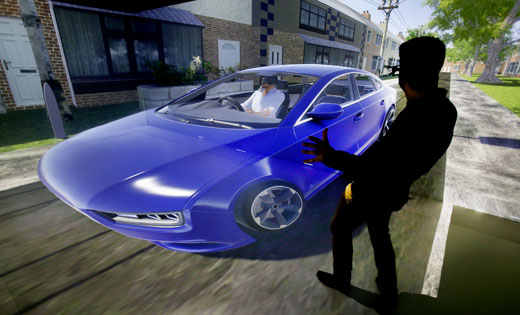 Virtuocity’s new Highly Immersive
Kinematic Experimental Research (HIKER) lab – the largest 4K resolution pedestrian
simulator in the world. This image and the homepage photo courtesy of Lorne
Campbell, Guzelian
Virtuocity’s new Highly Immersive
Kinematic Experimental Research (HIKER) lab – the largest 4K resolution pedestrian
simulator in the world. This image and the homepage photo courtesy of Lorne
Campbell, Guzelian
Learn more about our new Centre for Immersive Technologies
Academic colleagues working with immersive technologies are invited to discover how the likes of Virtual Reality (VR) and Augmented Reality (AR) can further help their research and education activity.
Our new Centre for Immersive Technologies was officially launched last month, harnessing their power to upskill the next generation and push the boundaries of possibilities in research and education.
Working alongside public and private sector partners, the Centre aims to create positive changes across society.
More than 80 researchers from a range of subjects at Leeds, including engineering, arts, humanities and social sciences, will focus on five priority areas – health, transport, education, productivity and culture.
The centre is being coordinated through six academic leads and has a poet and two ‘artists in residence’.
And academics across the University are encouraged to collaborate with the team behind the exciting new venture.
Professor Mark Mon-Williams, Centre Director, and his colleague in the School of Psychology, Associate Director Dr Faisal Mushtaq, are keen to emphasise that the raison d'être of the new Centre is to support all the great research happening across the eight Faculties at Leeds.
Professor Mon-Williams said: "We do hope that any academics who are working with immersive technologies, or who would like to learn more about how these technologies can help their research and education activity, will get in touch.
“Leeds is establishing itself as the UK's leading Immersive Technologies University and our goal is to make sure this ambition benefits the whole academic and student community.”
Professor Mon-Williams added: “Immersive technologies are a game-changer that will impact on every area of our lives, transforming how we live, work and play.
“This new Centre will help ensure the next technological revolution is harnessed for the benefit of society. By working with a wide range of partners, from technology companies and hospitals to museums, we are ensuring the work carried out by researchers in Leeds is making a real difference to the world.”
Virtuocity will form a key facility for the Centre for Immersive Technologies. Already home to our driving and truck simulators, Virtuocity uses immersive VR to conduct research that can improve the design of urban transport and city systems.
Unveiled as part of the Centre launch was Virtuocity’s new Highly Immersive Kinematic Experimental Research (HIKER) lab – the largest 4K resolution pedestrian simulator in the world.
The HIKER lab allows participants to interact with virtual urban environments and vehicles without the need to wear any VR equipment. Virtuocity’s three simulation laboratories – driving, truck and pedestrian – will be connected to create a single ‘multi-player’ environment, enabling researchers to address complex questions including how driverless vehicles will interact with their passengers and with pedestrians.
The Centre for Immersive Technologies will be based within the Leeds Institute for Data Analytics.
Contact the team to find out more about working with its researchers.
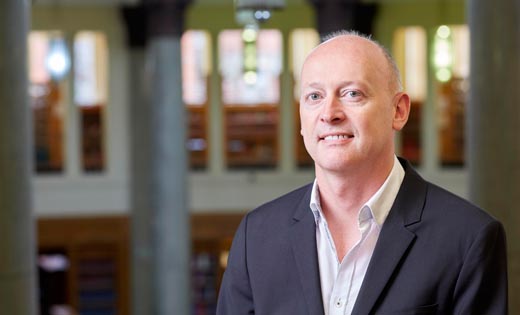 Leading the new Centre for Cultural Value is Dr Ben Walmsley
Leading the new Centre for Cultural Value is Dr Ben Walmsley
Leeds to be home of UK’s first Centre for Cultural Value
Why do arts and culture matter? What difference do they make to people’s lives? How do we know what difference they make to individuals and communities?
These and other key questions are at the heart of a unique new Centre for Cultural Value based Leeds.
The centre will focus on the role of arts and culture in areas such as conflict resolution, education, health and wellbeing, and community regeneration, bringing together researchers with expertise in these areas with artists, arts and cultural organisations, audiences, participants and local communities.
Funded by the Arts and Humanities Research Council, Paul Hamlyn Foundation and Arts Council England with an investment of £2 million over five years, the centre will collaborate and consult widely to advance understanding of the value of the UK’s arts and culture sector and its unexplored potential.
Dr Ben Walmsley, Associate Professor in Audience Engagement at Leeds, will lead the new centre.
He said: “Two questions at the core of the new centre’s work will be: ‘What does it feel like to engage with arts and culture?’ and ‘What tangible differences do arts and culture make to people’s lives?’.
“Our work will cover a diverse range of cultural activity, from grassroots and community activities to work produced by our world-leading national organisations.
“The Centre for Cultural Value will help stimulate public debate about the role of national and local governments in creating and enabling cultural value, informed by robust and rigorous research.”
The Centre for Culture Value will be based at Leeds’ School of Performance and Cultural Industries and supported closely by the our Cultural Institute, which plays a key role in strengthening our position as a global centre of research and teaching excellence in culture, increasing pioneering research collaborations with creative sector partners, widening cultural engagement and participation in arts and culture, and widening students’ skills.
Professor Frank Finlay, Executive Dean for the Faculty of Arts, Humanities and Cultures and Director of the Cultural Institute, said: "I am absolutely delighted to congratulate Ben Walmsley and the whole team of colleagues on their tremendous success in bringing the national Centre for Cultural Value to Leeds.
"This very significant achievement will reinforce the University’s considerable investment and strong commitment to providing wider strategic support for the vibrant diversity of cultural activity in the UK. It is also a wonderful example of the rich potential of our vision for the arts and humanities in the 21st century, which will deliver real benefit to the creative and cultural sector."
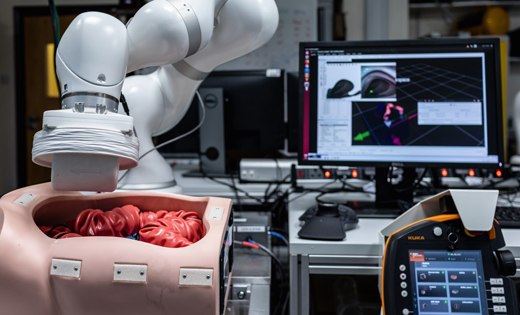 Development of a new tiny robotic
capsule could reduce the need for invasive endoscopy examinations
Development of a new tiny robotic
capsule could reduce the need for invasive endoscopy examinations
Miniature robot could detect early signs of cancer
Engineers have shown it is technically possible to guide a tiny robotic capsule inside the colon to take micro-ultrasound images.
Known as a Sonopill, the device could one day replace the need for patients to undergo an endoscopic examination, where a semi-rigid scope is passed into the bowel – an invasive procedure that can be painful.
Micro-ultrasound images also have the advantage of being better able to identify some types of cell change associated with cancer.
The Sonopill is the culmination of a decade of research by an international consortium of engineers and scientists.
The consortium has developed a technique called intelligent magnetic manipulation. Based on the principle that magnets can attract and repel one another, a series of magnets on a robotic arm that passes over the patient interacts with a magnet inside the capsule, gently manoeuvring it through the colon.
The magnetic forces used are harmless and can pass through human tissue, doing away with the need for a physical connection between the robotic arm and the capsule.
Professor Pietro Valdastri, who holds the Chair in Robotics and Autonomous Systems in Leeds' School of Electronic and Electrical Engineering and was senior author of the paper, said: “The technology has the potential to change the way doctors conduct examinations of the gastrointestinal tract.
“Previous studies showed that micro-ultrasound was able to capture high-resolution images and visualise small lesions in the superficial layers of the gut, providing valuable information about the early signs of disease.
“This discovery has the potential to enable painless diagnosis via a micro-ultrasound pill in the entire gastrointestinal tract.”
The research was funded by the Engineering and Physical Sciences Research Council, the Royal Society and the US National Institutes of Health.
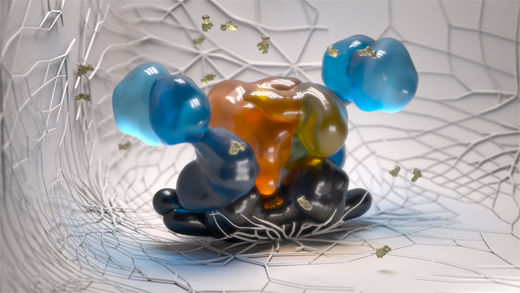 Scientists used powerful cryo-electron microscopes
in the Astbury Centre at Leeds to reveal the structure of an internal regulator
that helps control the body’s response to fight infection
Scientists used powerful cryo-electron microscopes
in the Astbury Centre at Leeds to reveal the structure of an internal regulator
that helps control the body’s response to fight infection
New regulator of immune responses discovered
Scientists have identified a new internal regulator that helps control the body’s response to fight infection.
The discovery could be a target for new drugs to tackle autoimmune diseases, such as lupus and scleroderma, where healthy tissues are attacked by the body’s own immune system.
“We want to put a brake on the body’s own immune system to stop it turning on itself,” said Dr Elton Zeqiraj, from the School of Molecular and Cellular Biology at Leeds.
“Our discovery has the potential to help us find a new drug to target this regulator, to suppress the immune system and stop the body destroying its own cells, even when there is no infection present.
“We’re a long way off being able to find a new effective treatment for autoimmune disease, but we’re excited because this discovery could open the door to a new class of drugs.”
Autoimmune diseases include a wide range of difficult-to-treat conditions, including Type 1 diabetes and rheumatoid arthritis.
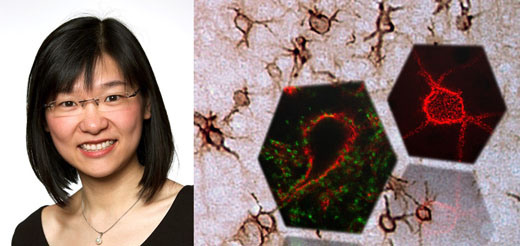 Leading a team
to develop potential treatments for chronic spinal cord injury patients is Dr Jessica Kwok
Leading a team
to develop potential treatments for chronic spinal cord injury patients is Dr Jessica Kwok
Funding offers hope for chronic spinal cord injury patients
Funding has been secured to develop potential treatments for chronic spinal cord injury (SCI) patients.
Currently, there are more than 2.5 million people worldwide living with paralysis from SCI, with the leading cause of death being respiratory failure.
Most research is focused on restoring respiratory function immediately after injury. However, a significant proportion of patients are living with the condition without much prospect for further improvement.
Now, Dr Jessica Kwok, University Academic Fellow in Medical Engineering Research in the Spinal Cord at Leeds, has received an £800,000 grant from the Medical Research Council (MRC) to try and find a solution to this problem.
Teaming up with King’s College London, she aims to use the funding to develop translational treatments to restore normal breathing in chronic paralysis patients.
Dr Kwok said: “The funding will allow us to verify and further develop the potential SCI treatment in enhancing respiratory functions. In addition, we shall map out the optimal treatment paradigm to maximise recovery.”
 Academics from Leeds and UCL are
investigating the thermal history of Earth’s core to try and resolve the Inner
Core Nucleation Paradox
Academics from Leeds and UCL are
investigating the thermal history of Earth’s core to try and resolve the Inner
Core Nucleation Paradox
Bid to resolve the Inner Core Nucleation Paradox
Investigating the thermal history of Earth’s core will be the subject of a £620,000 grant from the Natural Environment Research Council (NERC).
Dr Christopher Davies and Dr Andrew Walker, Associate Professors in the Institute of Geophysics and Tectonics (IGT), part of the School of Earth and Environment at Leeds, are teaming up with Professor Dario Alfè and Dr Monica Pozzo (both University College London) to try and resolve the Inner Core Nucleation Paradox, determining how and when the Earth’s inner core crystallised.
The solid inner core – a ball of iron and nickel more than 5,000km below the surface – is the most remote region of our planet and yet plays a crucial role in the Earth’s system.
As the whole planet cools, the inner core grows outwards from Earth's centre by a few millimetres each year. Remarkably, this slow process is the dominant power source that sustains fluid motion in the outer core, which is responsible for generating Earth's magnetic field.
The magnetic field emanates from the core and threads through the whole Earth, shielding the surface environment and low-orbiting satellites from potentially harmful solar radiation and enabling continued planetary habitability. Without the power supplied by inner core growth, Earth's magnetic field would probably not still be active today.
Dr Davies said: “The very presence of the inner core fundamentally changes the dynamics of fluid flow in the liquid core, altering the field we observe at Earth's surface in a complex manner that is still debated, and may influence the processes and characteristics of magnetic polarity reversals and excursions.
“Growth of the inner core also affects the structure and evolution of enigmatic regions at the top and bottom of the outer core observed by seismology, which are important because they apparently do not help to generate magnetic field.
“However, despite decades of study, recent work has uncovered a significant gap in our understanding of how the inner core formed. Astonishingly, the change is so significant that our most advanced models of Earth's evolution imply that the inner core should not have formed. Given that Earth has a solid inner core, this leads to a significant gap in our understanding of the evolution of our planet.
“The Inner Core Nucleation Paradox arises from the way that a liquid transforms to a solid as it cools through its melting temperature. Below the melting temperature, the energy of the solid is lower than the energy of the same amount of liquid. Although this means formation of the solid from the liquid would be favoured, in the absence of external surfaces (so-called homogeneous nucleation) some energy is required to form a solid-liquid interface; until this energy barrier is overcome, the liquid state can persist even below the melting point.
“The size of the barrier decreases as the system is super-cooled further below the melting temperature. We observe this effect in the atmosphere where super-cooled water droplets persist in the liquid state until snow forms around dust particles or ice flash-freezes on aircraft wings. These examples also illustrate the importance of heterogeneous nucleation, where a pre-existing solid (e.g. an aircraft wing) reduces the energy barrier and allows rapid freezing. Super-cooling is the missing ingredient from current models of inner core formation.
“Recent work, including our own pilot study using atomic-scale simulations, suggests the amount of super-cooling required for homogeneous nucleation of iron under core conditions is very large: 700-1,000K is needed for the inner core to nucleate on the billion-year timescale available. This is too large to be compatible with current theories of inner core growth. We thus cannot explain the presence of a solid inner core at the centre of the Earth, even though we know it exists. This is the Inner Core Nucleation Paradox.”
He added: “In this proposal, we will resolve the Inner Core Nucleation Paradox by a multidisciplinary approach that combines simulation of nucleation at the atomic scale with models of Earth's evolution spanning the past 4.5 billion years. We will determine whether the inner core nucleated homogeneously or heterogeneously and place robust bounds on the inner core age.
“These results will be incorporated into a new generation of core evolution models that will provide a coherent picture of deep Earth evolution and form the framework for interpreting fundamental magnetic and seismic observations of Earth's deep interior.”
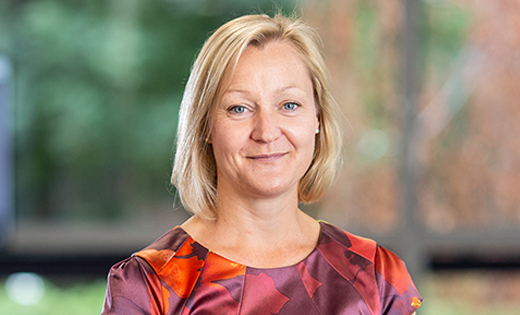 Professor Julia Bennell, who has been
appointed the new Executive Dean of LUBS
Professor Julia Bennell, who has been
appointed the new Executive Dean of LUBS
New Executive Dean for Leeds University Business School
Professor Julia Bennell has been appointed as the new Executive Dean of Leeds University Business School (LUBS).
Currently Deputy Dean at LUBS, Professor Bennell is a distinguished management scientist, with particular expertise in tackling combinatorial optimisation problems using mathematical modelling and artificial intelligence (AI).
Professor Bennell will also hold the post of Professor of Operational Research.
She was appointed to the post of Deputy Dean at the Business School in 2018, with a wide range of responsibilities.
Since arriving here, she has been instrumental in progressing the Business School and Law Transformation programme, and is playing a leading role in Athena Swan, EQUIS and AACSB accreditation exercises.
Professor Bennell has undertaken major research projects at the boundary between academia and industry, acted as the REF impact champion in 2014 and has a strong track record in teaching and educational development, holding a Senior Fellowship from the Higher Education Academy.
She is also a Vice-President of the Association of European Operational Research (OR) Societies and a member of the UK OR Society Research Panel.
Welcoming Professor Bennell’s appointment, Vice-Chancellor, Sir Alan Langlands, said: “Since joining us as Deputy Dean, Julia Bennell has proved to be a tremendous addition to the academic leadership community in Leeds.
“She epitomises the mission of the Business School to make an exceptional impact on global business and society through leadership in education and research; and she lives and breathes the University’s values of professionalism, inclusiveness, integrity and community.
“With total investment of £75.7 million planned over the next two years, Julia has the drive and determination to lead the Business School forward and to contribute to the University as a whole by promoting interdisciplinary research and an approach to learning that enables students to develop deep subject knowledge and prepares them to deal with complexity, diversity and change.”
Professor Bennell said: “I am honoured to be appointed Executive Dean of Leeds University Business School. This is a strong Business School with an excellent reputation for teaching and research.
“This is an exciting time to lead the school as it invests in new facilities and ways of working, providing huge opportunities to both lead internationally in teaching innovation and further build its global research presence. I am looking forward to working with colleagues towards a successful future.
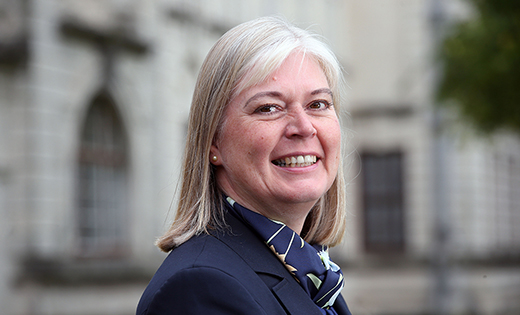 Professor Nora de Leeuw, new Executive
Dean for the Faculty of Engineering and Physical Sciences
Professor Nora de Leeuw, new Executive
Dean for the Faculty of Engineering and Physical Sciences
New Executive Dean for new Faculty!
Professor Nora de Leeuw has been appointed as the inaugural Executive Dean of the Faculty of Engineering and Physical Sciences.
Professor de Leeuw is a distinguished scientist, currently the Pro Vice-Chancellor (International and Europe) and Professor of Computational Chemistry at Cardiff University, where she has also led the Doctoral Academy.
She is also Professor of Theoretical Geochemistry at Utrecht University in the Netherlands and a Visiting Professor of Biomaterials at Université de Paris-Est in France.
Professor de Leeuw is an elected Member of Academia Europaea and a Fellow of the Royal Society of Chemistry. She is also elected Fellow of the Learned Society of Wales and has held an Industry Fellowship and a Wolfson Research Merit award from the Royal Society.
The Faculty of Engineering and Physical Sciences is a new faculty to be established on 1 August, building on the existing strengths of the Faculties of Engineering and Mathematics and Physical Sciences, as well as the excellence in student education and research in eight existing Schools.
The Faculty employs 1,100 staff, supporting 4,800 undergraduate students and 2,100 postgraduate students.
The total income of the new Faculty will be c£150 million, and current developments include the Sir William Henry Bragg Building, the Bragg Centre for Materials Research and a new Institute for High Speed Rail and System Integration.
The new Faculty will also draw heavily on the University’s membership of the Henry Royce, Rosalind Franklin and the Alan Turing national research institutes.
Welcoming Professor de Leeuw to the University, Vice-Chancellor, Sir Alan Langlands, said: “Nora de Leeuw is an outstanding scholar and leader in her field of computational chemistry, with an established international reputation. I am delighted to welcome her to the University.
“She has a proven track record of working across disciplines, institutions and continents and is highly respected for her work in building enduring links between academia and industry, driving the development of innovative doctoral training centres and promoting high standards of undergraduate education.”
Professor de Leeuw said: “I am absolutely delighted to have been given the opportunity to become the first Executive Dean of the Faculty of Engineering and Physical Sciences at Leeds.
“I have always advocated cross-disciplinarity in both teaching and research and the new Faculty offers real opportunities to develop innovative teaching programmes across the different Schools.
“It will also offer students more diverse opportunities to experience different environments during their study or in their research projects, enabling them to make more informed choices about future study or employment.
“The Faculty of Engineering and Physical Sciences, with the new Bragg building, the Bragg Centre for Materials Research and the High Speed Rail Institute, will be in an excellent position to take advantage of funding opportunities afforded by the Government’s Industrial Strategy and the closer collaboration between Research Councils under UKRI.”
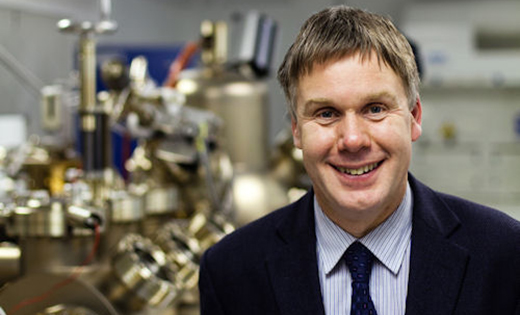 Professor Edmund Linfield, the first
Director for the Bragg Centre for Materials Research
Professor Edmund Linfield, the first
Director for the Bragg Centre for Materials Research
First Director for Bragg Centre for Materials Research
Professor Edmund Linfield has been announced as the first Director for the Bragg Centre for Materials Research.
Currently Chair of Terahertz Electronics at Leeds, Professor Linfield has helped establish the University as a global leader in terahertz technology.
Together with Professor Giles Davies, he was awarded the Institute of Physics Faraday Gold Medal in 2014 for his work in experimental physics.
The Bragg Centre has been created to enable unprecedented advances in the discovery, creation and design of new materials.
Professor Linfield said: “We advance our understanding of high-value materials through a combination of both fundamental scientific discovery and applied research, exploiting materials that are often engineered at the atomic or molecular level. We also work with industry to understand and tackle their problems.
“These challenges demand that academics work across disciplines, so the Centre brings together leaders from interconnected fields to address global problems in materials research.
“I am very excited to see what discoveries can be made in the coming years by the incredibly talented researchers we have here at Leeds.”
‘Surgery’ to support pedagogic research to open
A rolling one-stop-shop for all your pedagogic research (PedR) needs has opened its doors at the Leeds Institute for Teaching Excellence (LITE).
The LITE PedR surgery provides informal guidance and support to any member of staff at Leeds on any aspect of a pedagogic research project. It is held on the first Monday of every month in the LITE meeting room, 18 Beech Grove Terrace.
Subjects sought for advice could include: feedback on a research idea; guidance on data gathering; how best to share and disseminate work, or how best to demonstrate impact.
Email Katie Livesey with a brief outline of the support you require. If you are unable to make the surgery, email the LITE team, which will be happy to find a suitable alternative.
Our extraordinary research: Why Leeds?
UKRI, the UK’s biggest public funder of research and innovation, recently chose to mark its anniversary with an event at Leeds. Read our Spotlight feature highlighting the outstanding research that resulted in Leeds being selected to host this prestigious event.
Research Spotlight video
Learn more about some of the incredible work taking place at Leeds in our new Research Spotlight video, available on Twitter, Facebook, YouTube and LinkedIn.
How to feature in future round-ups
Please contact Internal Communications if you or one of your colleagues would like to appear in this monthly feature.
Posted in: University newsResearch and innovation